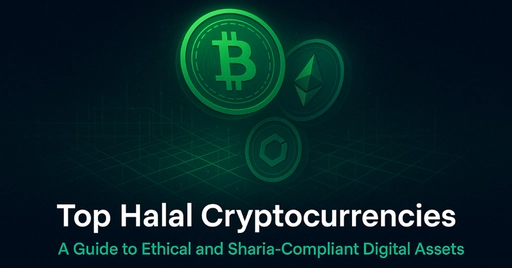Top Halal Cryptocurrencies: A Guide to Ethical and Sharia-Compliant Digital Assets
Halal cryptocurrencies are also an important innovation in the context of ethical investing in the constantly developing field of digital finance. It is crucial for Muslims interested in engaging in cryptocurrency trading but in a way that is compliant with Sharia laws to be able to identify Sharia-compliant digital currencies. This guide aims to explain the current situation of ethical crypto assets and give recommendations for investing in compliance with Islamic finance.
Navigating Sharia-Compliant Digital Assets
Islamic digital assets should be compliant with the principles of Islamic finance that do not allow riba, gharar, and maysir. Determining whether a given Islamic cryptocurrency is compliant with these principles requires an analysis of the crypto technology, application, and trading behavior. It is important that the asset is beneficial and does not perform any prohibited operations.
Criteria for Identifying Halal Cryptocurrencies
When selecting cryptocurrencies that are consistent with Islamic law, consider the following criteria: When selecting Halal coins that are consistent with Sharia principles, consider the following criteria:
Purpose and Use Case: The digital currency should fund a good and moral cause, that is useful to society, and should not engage in any prohibited activities or things that are considered haram.
Transparency and Integrity: Cryptocurrency in Islam should be easily understandable. There should be clear information about the technology that the digital currency is built on. This transparency helps make the asset’s functions and transactions easy to understand and free from ethical issues.
Absence of Interest and Speculation: Halal crypto trading must ensure that the digital currency does not have interest-based mechanisms or speculative trading. The financial activities should be Sharia-compliant, meaning they must avoid riba (interest), gharar (excessive uncertainty), and maysir (gambling).
Choosing Halal Crypto Exchanges
Choosing the right platform for purchasing and selling digital currencies is equally crucial. Halal crypto exchanges are intended to operate under the guidelines of Islamic finance, providing services that do not involve interest and that have clear fee structures. These exchanges make sure that your trading activities comply with the set ethical standards.
Trends in Halal Financial Technology
The enhancement of Halal fintech and Sharia-compliant blockchain technology shows the increasing trend of ethical investment. These innovations seek to increase the level of financial literacy and also meet Islamic standards. The sector is however, expected to provide more solutions as it grows in a bid to meet the needs of the Muslim investors.
Saraf Screening: Ensuring Sharia Compliance
In this regard, Saraf screening is a crucial process for investors who wish to be certain that their assets are Sharia-compliant. This entails a critical assessment of financial operations and tools to ensure that they are Shariah-compliant. Saraf screening is useful in ensuring that your investments are free from any taint and are ethical.
Conclusion
Trading in crypto while being Shariah-compliant is not an easy thing to do. Thus, by investing in Sharia-compliant digital assets and choosing ethical trading strategies, investors can combine their financial activities with their beliefs. To get more details on Halal crypto exchanges and Shariah-compliant coins, or for individual consultation, please refer to our Halal crypto guide and get in touch.


